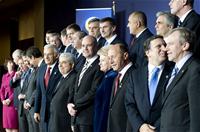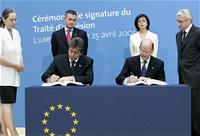Bulgaria's and Romania's EU membership damaged the credibility in the enlargement
euinside, December 28, 2009
 The end of each year is usually the period for making analyses of the past year, of forecasts for the next and of numerous comments and surveys. However, this year is different because beside marking the end of 2009, in just couple of days we will celebrate the end of the first decade of the 21st century. And those, inarguably, were 10 years, loaded up with many expectations and that many disappointments from the EU. In this regard Hugo Brady from the Centre for European Reform - a non-governmental research institute based in London, wrote an essay, entitled "The EU must learn from its mistakes over the past decade".
The end of each year is usually the period for making analyses of the past year, of forecasts for the next and of numerous comments and surveys. However, this year is different because beside marking the end of 2009, in just couple of days we will celebrate the end of the first decade of the 21st century. And those, inarguably, were 10 years, loaded up with many expectations and that many disappointments from the EU. In this regard Hugo Brady from the Centre for European Reform - a non-governmental research institute based in London, wrote an essay, entitled "The EU must learn from its mistakes over the past decade".
Yet in the very first sentence of the essay he writes that the EU needs new thinking because after 8 years of stop-start negotiations, the Union finally has a new rulebook, the Lisbon treaty, which entered into force on the 1st of December. The member-states are waiting for a new European Commission and a new European Council president to take office early next year. But, in spite of the shared anxieties about the economic growth, government debt, the stability of the euro, immigration and the environment, there is not yet a clear sense of what the EU's priorities for the next five years should or will be.
Further on Hugo Brady writes that given the global recession, many assume that the EU's next 'big idea' will have an economic focus. Mario Monti, a former competition commissioner, has already proposed that EU countries should quicken their recovery from the crisis by opening up trade in services in exchange for a deal on harmonising tax bases. Others expect a new initiative on climate change – like a European carbon bank – or tighter rules on deficit spending to prevent the risk of default in the euro area.
However, to make all this happen, it is necessary the EU to consider carefully the Union's mistakes and failures over the last ten years. Mr. Brady lists the successes of the Union in just one sentence: it successfully rolled out a single currency, expanded to 27 members, established the world's first functioning carbon trading scheme, deployed its first military missions and agreed a common arrest warrant to tackle cross-border crime. Instead, the failures seem to be much more and among them the name of Bulgaria is also mentioned:
- The EU spent most of the decade following the will o' the wisp of a grand constitution, to the detriment of its reputation both within the Union and in the outside world (details of the entering into force of the Lisbon Treaty);
- The premature accession of Bulgaria and Romania to the Union in 2007 damaged the  credibility of EU enlargement, due to persistent problems with corruption and organised crime in these countries. Now that they are full EU members, reform of public administration and the judiciary has slowed (an outside and impartial analysis of the first year of Bulgaria's EU membership you could read on euinside here and an internal estimation you could see here);
credibility of EU enlargement, due to persistent problems with corruption and organised crime in these countries. Now that they are full EU members, reform of public administration and the judiciary has slowed (an outside and impartial analysis of the first year of Bulgaria's EU membership you could read on euinside here and an internal estimation you could see here);
- The EU made a similar error in allowing the accession of Cyprus in 2004. In doing so, the member-states removed probably the only international leverage that could have helped to push the island's territorial conflict to resolution. Since then the Cypriot government has unabashedly used its EU veto to complicate the Union's ties with Turkey and NATO. Both of those relationships are critical for the Union's geopolitical standing;
- The EU spent most of the decade trying to convince key global players like the US or China to believe that it is an emerging actor in a multipolar world. Yet it has been unable to overcome internal divisions over its relations with Russia, energy policy and reform of European representation in international organisations (where the EU is still represented by separate member states like in the G20, the UN, WTO, etc). Even the Union's jealously guarded image as a global leader on climate change is exaggerated (the final deal at the Copenhagen climate change summit was crafted in the absence of the EU). Unless the member-states find a way of summoning the political will to forge common positions on sensitive issues like, for example, how to handle meeting the Dalai Lama, the Europeans will continue to play ping pong while the rest of the world plays chess, Hugo Brady writes;
- The EU was wrong to lump together its external policies towards non-EU countries in the Mediterranean and Eastern Europe in the so-called European neighbourhood policy. Within a few years that policy error had to be tacitly acknowledged with the decision to create both a 'Union for the Mediterranean' and an 'Eastern Partnership'. But both these initiatives still suffer from a lack of substance (you can read more about the Eastern Partnership here);
- With the above the failures do not end. The hardly achieved compromise in 2005 for the "services directive" was a missed opportunity to boost intra-European trade in services and thus help complete the single market. If the EU had been able to agree on something like the original 'Bolkestein directive' (after the name of a Dutch commissioner) – before member-states and the European Parliament watered it down – the ability of the eurozone to withstand economic shocks like the current recession would have been greatly strengthened;
- Also in 2005 the member-states failed to find the political courage to reform the EU's budget and have so far reneged on a commitment to engage in a serious review of how the Union's annual expenditure of €120 billion should best be allocated. At the moment expenditures, revenues and procedures are all inconsistent with the present and future state of EU integration (more on the topic of the EU budget for 2007-2013 and how the compromise has been reached, you can read on euinside here);
- And another, this type purely institutional failure - the EU's Court of Auditors declined to sign off its accounts at any point throughout the decade, mostly due to irregularities in how funds are dispersed within the member-states. This, plus a number of scandals over expenses paid to MEPs, have damaged the EU's credibility with taxpayers. Any future increase in the size of the EU's budget would be politically untenable without demonstrable reform.
In the end Hugo Brady concludes his analysis of the first decade of the EU in the 21st century by quoting the eminent Europeanist Ralf Dahrendorf from his essay, written in ... 1996: "All too often, today's European Union forces its supporters to apologise for its strange ways: towards democrats for its bureaucratic opaqueness, towards free traders for its protectionism, towards applicants for membership for its apparent lack of a sense of urgency, and towards trading partners elsewhere, notably in the poorer parts of the world, for its crude and at times destructive pursuit of self interest. If such apologies continue to be necessary, support will wane and eventually vanish. European reform is imperative if the European Union is to survive".
 As the euinside has written many times, finding the above mentioned political will is impossible when the level of political, economic, social and civil development among member states is so different. This feeds further the tendencies of some member states to seize European power to protect their own interests. In fact, such tendencies appeared quite clearly during the election of the first in European history permanent president of the European council - the Belgian premier Herman van Rompuy and the first foreign minister of the Union - the British Lady Catherine Ashton.
As the euinside has written many times, finding the above mentioned political will is impossible when the level of political, economic, social and civil development among member states is so different. This feeds further the tendencies of some member states to seize European power to protect their own interests. In fact, such tendencies appeared quite clearly during the election of the first in European history permanent president of the European council - the Belgian premier Herman van Rompuy and the first foreign minister of the Union - the British Lady Catherine Ashton.
The selection of fields of the European commissioners, provoked by the lack of possibility for the European Commission president to select his own team, is also a proof of the differences among member states - the new commissioners are so different in terms of biography, education, institutional experience and fields, that it might not be impossible the European Commission to lose a large part of its leading role in European politics so far.
In other words, it might be a good news that after almost 10 years of search of the most appropriate institutional treaty which could make the EU a stronger global player, we finally have the Lisbon Treaty into force. Instead, the too many compromises made the treaty something very similar to handicapped horse. And since the EU will hardly find strength and will to integrate even further, the next decade will probably be vital of the Eu and its future in general.